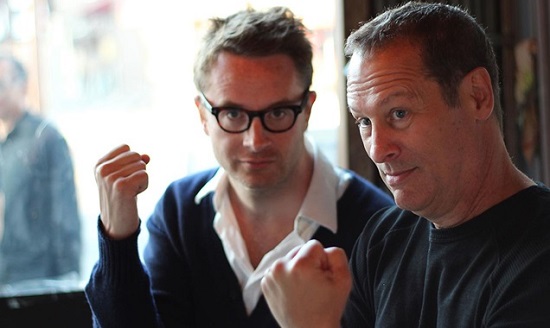Imagine your own obituary. Morbid, sure, but just go with it for a sec. An imagined tribute to your ideally very long, emotionally-and-creatively-fulfilled life will inevitably err on the side of fantasy. The kind where a career as part of a run of pioneering punk rock bands would be little more than a mere footnote – the sort of thing thrown in as vague background information, the glamorous appetizer to your life’s great work. That great work, however, being so creatively diverse, so essential to the similarly diverse visions of other creative geniuses, that it’d be impossible to condense it into a newspaper-standard word count. It all sounds fantastical, absolutely. Unless you’re Cliff Martinez.
It was in 1989 that Martinez, dissatisfied as a drummer for bands like Red Hot Chili Peppers, The Weirdos, and Captain Beefheart, began working as a composer for film and television. A wide-eyed filmmaking newcomer named Steven Soderbergh selected him to score his first feature, Sex, Lies, and Videotape, and the film’s eerie, ambient soundscape led to a fruitful series of collaborations between both men. Among them the wiry horror beats of 2011’s Contagion, the blissful melancholy of 2002’s Solaris, and the Spielbergian magic of 1993’s King of the Hill.
While he continues to work with Soderbergh, notably supplying thundering, anachronistic electronica for his historical medical drama The Knick, Martinez has spent the past decade forging new partnerships with an array of distinctive filmmakers. He scored Harmony Korine’s candy-coloured crime caper Spring Breakers in 2013, and in 2011 partnered with Nicolas Winding Refn on Drive, delivering what has quickly become his most recognisable and imitated work. His collaborations with Refn continued with 2013’s polarising Only God Forgives, and now The Neon Demon – a tale of fashion, fame, femininity and Cronenberg-style body horror that recently floored Cannes.
The sounds of The Neon Demon are a seductive canvas of light and dark, full of rubbery synths and pulsating dance beats, buoyed by airy ambience that calls to mind a dirty Los Angeles sky. Martinez is the rare composer whose superlative work can soundtrack both a grandiose night of sweaty excess, as well as it’s resulting morning comedown. We were lucky enough to grab some time on the phone with the maestro himself.
For Drive, I understand that Nicolas Winding Refn brought you a collection of tracks that he wanted you to emulate in your own score. How did he initially pitch The Neon Demon to you?
Cliff Martinez: Unlike Drive, he began talking about the film before there was even a script. In a general way he told me the story. Then once there was a script, he sent me the script. And once he shot something, he sent me a rough edit of the film. Whereas with Drive, it was a locked picture that he sent me, about five weeks before the film was to be completed. So I had a little bit more time to think about things and more time to discuss.
Is more time always beneficial?
CM: The shorter it is, the more intense it is. I usually get hired when the film is in a pretty advanced state. Nicolas and Steven Soderbergh, because I’ve worked with them before, are the only people that bring me in at the script stage, before anything is shot, to begin discussing things. So that’s kind of unique to those two directors. Though I don’t like to write any music to a script. Experience has taught me that’s generally a waste of time. But it’s really helpful to begin a dialogue about the story, and possibly about what the score might sound like, prior to seeing any of the picture.
I know Nicolas tends to shoot his films chronologically. Is that something you try to emulate when you’re composing?
CM: I’ve never attempted that. I usually just dive in wherever I feel inspired. Sometimes I’ll pick out a scene that is perhaps representative of the entire film, or a large part of the film, and sometimes I just start noodling, and the noodle will find some place in the film where it feels most appropriate. But I’ve never tried to work chronologically. I don’t think I have the discipline to do that.
I also read somewhere that you always hope to pick up a new instrument at the beginning of each new project that you take on. Did you unearth anything new for The Neon Demon?
CM: No, there was no exciting, exotic instruments for The Neon Demon. In fact, I don’t think there were any. Usually it’s a real acoustic instrument of some kind, but I think Neon Demon was all software synthesizers. There were no real instruments at all.
Was there a specific sound you wanted to evoke? I’m assuming it was predominantly synthesizers that you were working with for this one…
CM: There were a couple of vintage software synthesizers that I was enamoured of. One was a software emulation of the Roland Super Jupiter, and another one was the ARP 2600, so I was trying to get a kind of old-fashioned ’70s synthesizer sound. There were a collection of synthesizer sounds that I felt evoked a sense of period, which wasn’t apropos of anything in particular. It was just an idea I had to make it a little more interesting.
Do you remember Nicolas’ initial directions when it came to the score?
CM: I think Nicolas gave me a rough-cut of the film with the music of Bernard Herrmann cut into it as temporary music. So that gave me the idea that he was looking to superimpose a period feel onto the film. So there’s no reason for it, other than being an interesting way to go. He never really offered a good explanation for it, except that he said he had tried "everything." I didn’t know what he tried, but he said he tried a lot of music, and that was the only thing that seemed to work.
Is he very communicative in terms of his process?
CM: Nicolas is usually pretty articulate about music. For the first part of the process he leaves me alone. Once I write something, he’s a lot more hands-on with his feedback. [Then] he has something to say. But his initial direction is in the form of this temp score, which actually tells you a lot. Normally it would give you a great sense of direction in terms of the style and the approach. The Bernard Herrmann reference kind of threw me, because I didn’t think he wanted the sound of a string orchestra. He just said, "I don’t want it to sound like Bernard Herrmann, but I would like it to feel like Bernard Herrmann."
How did you figure that one out?
CM: I have varying degrees of attachment and influence by way of the temp score. In this case, I didn’t take a whole lot from Bernard Herrmann. I felt like I had to come up with something else. I knew Nicolas wanted a sparse, electronic score. So I listened to the film once or twice through with the Herrmann, and then quickly moved away from it and did something that was perhaps more similar to Drive, more similar to Only God Forgives.
I was thinking as well about the film’s premise, about a young model arriving in Los Angeles for the first time and experiencing all kinds of horror, and how your score kind of alternates between very ethereal sounds and sounds that are so anarchic and almost nightmarish. I was wondering about your own perception of Los Angeles? Does it echo in the score?
CM: No. But I do live there. A lot’s been said and written about Los Angeles-ness and Nicolas’s films or my music, and I have no awareness of that. If I do a film that’s set in Afghanistan or something, or China, I try to acknowledge the setting, but when the story takes place in Los Angeles, I don’t do anything consciously to acknowledge the place. So any sort of musical reference that the score might make to Los Angeles is unintended.
But does that story, of somebody arriving in LA to fulfil their dreams – did you empathise with that desire at all on a personal level?
CM: Jesse, the main character in Neon Demon, is certainly familiar to me. It’s very much a Star Is Born story. She comes from a small town in the Midwest to make it big in modelling, and I came to Los Angeles to be in the music business –in a rock and roll band— so that’s all a very familiar story to me. And a familiar story to many of my own peers in music.
Do you think you can draw parallels between the Los Angeles of The Neon Demon and the Los Angeles of the real world?
CM: I don’t think real life is quite as bleak as the film. [Laughs] I think the music business is becoming more difficult. It’s really taken a big hit with piracy, so it’s a lot more difficult. I mean, it was kind of an impractical career choice when I did it 25 years ago, but nowadays it’s truly reckless. If I had kids, I don’t think I would recommend they pursue a career in music.
So is that why you transitioned quite early into composing? Is there something about composing that’s more attractive, or more fulfilling, than working in a band?
CM: I think the fact that you can get paid for it is a big incentive to people. Singer/songwriters spend two or three years making an album, and then it goes up for sale and everybody pirates it and you don’t make any money. Whereas, writing a film score you still get presented with a paycheck. Composers are in some ways the last frontier of musician that gets a paycheck for their musical services.
Is the solitude of composing similarly attractive? At least in comparison to a life of touring and audiences?
CM: For me, yeah. Because I’m kind of an antisocial person. I realised when I was playing in bands that I wasn’t that comfortable being on-stage, and I preferred to be behind-the-scenes. I like the seclusion of composing.
And do you have any plans to work with Nicolas again?
CM: I’m sure we will. I haven’t heard anything, but Nicolas I think is consumed with getting this current project off the ground so I haven’t heard anything yet. But I’m sure that he’ll come up with something.
What kind of relationship do you look for in terms of a director? Is there a personality type that you tend to gel with?
CM: I like directors that give their composer a juicy role in their films. Some films have a small, minor role for music, some have a larger role. And Nicolas usually likes to put the music out into the spotlight, so I’m always grateful for that. I would like to find more people who are as interested in inviting music to have a big role in their films, such as Nicolas does. I guess I also like directors that like to do something a little bit out of the mainstream, and I also like directors that are fairly decisive about what they think. There’s nothing worse than a director that keeps changing their mind. Because, unlike the directors I work with, I’m not decisive at all. [Laughs]
Cliff Martinez’s score for The Neon Demon is available digitally and on CD now and on vinyl July 8 via Milan Records. The Neon Demon hits cinemas July 8.



